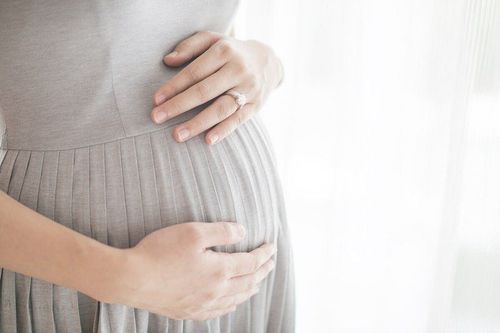This is an automatically translated article.
During pregnancy, erratic changes in the mother or fetus's body make the mother feel anxious and insecure. This mentality has a negative impact on the health and comprehensive development of mother and baby. So does cardiac arrhythmia affect the fetus, let's find out through the article below.
1. Heart activity during pregnancy
During pregnancy, in addition to having to nourish herself, the mother must also provide adequate oxygen and nutrients to the fetus. As a result, pregnancy puts pressure on the heart and circulatory system. During pregnancy, the mother's blood volume may need to increase by 30-50% to nourish the fetus, and the heart rate ejected per minute also increases by 30-50%. The result of this process is an increase in the mother's heart rate. A pregnant woman's heart rate begins to increase from the 10th week, and can increase by 10 beats per minute towards the end of pregnancy.Labor and birth also put pressure on and the heart has to work harder. During labor, the pressure and blood flow in the abdomen change suddenly, when the baby is born, the blood flow through the uterus is lost to the heart, putting pressure on the heart, causing the heart to work. more and can cause arrhythmia in pregnant women.
2. Why do pregnant women have arrhythmias during pregnancy?
Women with arrhythmias during pregnancy can be caused by many reasons such as:
Physiological changes in the mother's body: during pregnancy, the uterus becomes larger for the fetus to develop, which leads to increase the supply of blood and nutrients and make the heart beat faster. In addition, the large uterus compresses the diaphragm and changes the heart axis, the heart is almost horizontal. When the baby is born, the uterus contracts and the heart suddenly returns to its normal position. This sudden change can disrupt the functioning of the heart, can cause arrhythmia in pregnant women or even stroke, ... Psychological changes of the mother: Pregnancy and Giving birth is a journey full of hardships, difficulties and causes a lot of anxiety for the mother, which can cause the mother to have arrhythmia during pregnancy. Other diseases of the mother: Diseases of the hematology and hematopoietic system such as anemia can cause cardiac arrhythmias in pregnant women. When anemia, the mother easily feels tired, short of breath, ... If the anemia is mild, pregnant women can supplement iron by themselves with iron-rich foods, and at the same time need to consult a doctor. about taking care of your health during pregnancy to prevent the condition from getting worse. In addition, other diseases such as thyroid disorders, pre-eclampsia, pulmonary hypertension,... can cause cardiac arrhythmias in pregnant women. History of cardiovascular diseases such as: Hypertension, dyslipidemia, arrhythmia, aortic disease, cardiomyopathy, heart failure, rheumatic heart disease, aortic valve stenosis, mitral valve, etc. .. also contributes to the mother's arrhythmia during pregnancy. Other factors such as unhealthy lifestyle (smoking, use of alcoholic beverages, stimulants,...), drug use during pregnancy,... can make the phenomenon appear. Cardiac arrhythmias in pregnant women.
3. Mother's arrhythmia affects the fetus?
Many women with heart disease do not dare to get pregnant because they are worried about whether the mother's arrhythmia will affect the fetus because the pregnancy process puts a lot of pressure on the heart and circulatory system. In fact, women with cardiovascular disease can still have healthy babies if they proactively prevent and detect and promptly handle risks during pregnancy.
Risks of arrhythmias in pregnant women during pregnancy and childbirth:
Stroke: The uterus becomes larger during pregnancy for the growing fetus, compressing the diaphragm and changing the heart axis , the heart is almost horizontal. When the baby is born, the uterus contracts and the heart suddenly returns to its normal position. This sudden change can disrupt the functioning of the heart, can cause arrhythmia in pregnant women or even a stroke,... Increased risk of preterm birth: Keeping the pregnancy in utero If the mother suffers from cardiovascular diseases, this burden increases as the pregnancy progresses towards the end of pregnancy. This can cause premature birth or take the initiative to give birth early to ensure the safety of the mother. If a baby is born too preterm, the lungs are not fully developed, they can be susceptible to endocardial disease, making it difficult for the baby to breathe and leading to death. Underdevelopment of the fetus: When the mother's heart is damaged, the heart function declines and there is a lot of exertion during pregnancy, which reduces the flow of blood and nutrients to the fetus, causing the fetus to become less developed than other women. normal.
4. What to do when having arrhythmia during pregnancy?
Before planning to become pregnant, if a woman has cardiovascular diseases, she should discuss with a specialist to be evaluated and considered for treatment before becoming pregnant. Depending on the individual case, some cardiovascular drugs may be contraindicated during pregnancy, or require a change in dosage, or an alternative medicine.
During pregnancy, women with cardiovascular disease need regular prenatal check-ups, some tests such as echocardiography, electrocardiogram will help evaluate heart disease.
To ensure the healthy development of the fetus and the health of the mother, when having an arrhythmia during pregnancy, it should be noted:
Do not work too hard. When taking stairs, you need to go slowly, if you feel short of breath and your heart beats fast, you need to stop and rest. Keep a positive, happy mood. Avoid anxiety, stress, impatience. When in the middle and late stages of pregnancy, it is necessary to pay attention to rest, not to be active, this is beneficial for the heart, reducing shortness of breath, arrhythmia in pregnant women. The mother should exercise gently and walk often to be good for the pregnancy process. Diet during pregnancy should be noted: Limit salt intake and use of foods with a lot of bad fats such as processed foods, fast foods,... Increase the intake of foods rich in vitamins and minerals. minerals, fiber such as fruits, vegetables, whole grains,... Do not use alcohol, stimulants, caffeinated drinks,...
Please dial HOTLINE for more information or register for an appointment HERE. Download MyVinmec app to make appointments faster and to manage your bookings easily.













